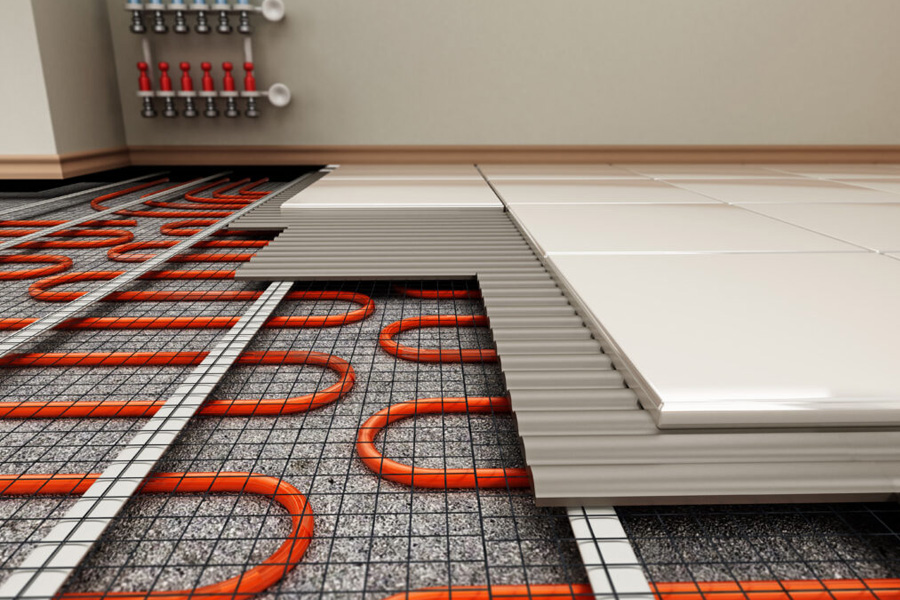
Underfloor heating systems are gaining popularity among homeowners looking for cozy heating solutions. These systems not add to the visual appeal of your home by removing the need for radiators but also ensure a uniform and consistent heat distribution.
However picking the underfloor heating system can feel overwhelming due to the array of choices available. This article is designed to help you navigate through the process of choosing the suitable underfloor heating system for your home by exploring different types, their advantages and key factors to consider.
Different Varieties of Underfloor Heating Systems
There are primarily two categories of underfloor heating systems; electric and water based (hydronic).
Electric Underfloor Heating:
Electric Cable Systems
These systems involve cables installed beneath the floor surface. They work well for both constructions and renovations as they have a thin profile making them ideal for rooms where floor height is a concern.
Electric Mat Systems
These are pre made mats with embedded electric heating elements. They are easier and faster to install than cable systems making them particularly suitable for rooms or areas, with regular shapes.
Water Based (Hydronic) Underfloor Heating
Underfloor heating involves a network of pipes installed beneath the floor to circulate water for heating. It is commonly preferred for spaces or entire homes especially in new constructions or significant renovations due to the intricate installation process.
Advantages of Underfloor Heating
1. Energy Efficiency
Underfloor heating systems operate at temperatures than traditional radiators leading to substantial energy savings. Water based systems in particular work efficiently with condensing boilers or heat pumps.
2. Comfort and Uniform Heat Distribution
These systems ensure cozy heat distribution across the room eliminating cold spots.
3. Aesthetic Appeal and Space Optimization
Underfloor heating eliminates the need for radiators creating wall space and enhancing interior design flexibility.
4. Enhanced Indoor Air Quality
Unlike radiators underfloor heating systems do not spread dust. Allergens, promoting a healthier indoor environment.
Considerations to Keep in Mind
1. Property Type
Choosing between water based systems depends on the property type and specific needs. Electric systems are typically better suited for areas or individual rooms while water based systems are ideal, for larger installations or whole home heating.
2. Costs of Installation
Electric underfloor heating systems usually have initial setup expenses while water based systems tend to cost more upfront but are more cost effective in the long run.
3. Floor Insulation
The existing floor structure and insulation are factors that impact the efficiency of an underfloor heating system. Proper insulation is necessary to prevent heat loss and ensure performance. Sometimes additional insulation may be needed, affecting the installation cost and feasibility.
4. Flooring Material
The type of flooring material used influences the selection of a heating system. Tiles and stone are conductors suitable for both electric and water based systems. Wood and laminate require consideration due to their insulating properties and potential for expansion or contraction. Carpeting can also be considered, long as it is of a suitable thickness for efficient heat transfer.
5. Control Systems and Zoning
Modern underfloor heating systems include controls that enable you to establish different heating zones within your home. This zoning feature offers increased flexibility and energy savings by heating areas that are, in use.
Maintenance and Longevity; Generally electric systems require upkeep compared to water based systems, which may need occasional inspections to ensure there are no leaks or pipe issues. However both types are crafted to be sturdy and enduring with maintenance and installation.
Installation and Expert Advice
The process of installing underfloor heating systems can vary significantly depending on the type and existing floor structure. While electric systems are relatively easy to install water based systems require extensive work and should ideally be installed by a professional. It’s crucial to seek guidance from an installer who can evaluate your specific requirements and suggest the most suitable solution.
Moreover obtaining a calculation of heat loss for your residence can help determine the necessary output and guarantee efficient system operation. This calculation considers factors like area size, insulation levels and desired temperatures to provide an estimate of heating requirements.
Conclusion
Selecting the underfloor heating system for your home requires thoughtful deliberation on various aspects such, as property type, installation expenses, floor construction and preferred control features.
To make a informed decision that ensures long term comfort, efficiency and value it is essential to grasp the variances, between electric and water based systems and assess your unique requirements. Collaborating with an installer and thoroughly evaluating your homes heating needs are vital aspects of guaranteeing a successful and gratifying installation.

